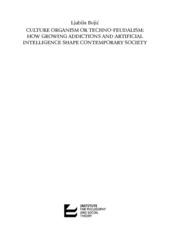Culture Organism or Techno-Feudalism: How Growing Addictions and Artificial Intelligence Shape Contemporary Society
Књига (Објављена верзија)
Метаподаци
Приказ свих података о документуАпстракт
The book describes our tech driven society as the Culture Organism, while the most significant social challenge is repression of the individual by corrupt social agents. This is connected to the appearance of light and mild addictions, discovered through quantitative inquiry, which is put into a wider context, identifying the outcomes as social polarizations, appearance of echo chambers, spread of misinformation and fake news, rise of populist leaders and decreased democratic capacity. Theories of anomie, alienation and mass society are presented as a basis for research. The nature of media is examined in the context of addiction intensity, leading to the conclusion that new media, such as smartphones, are more addictive than the older media. This may be because new media have more reality-mimicking features. The study concludes that AI recommender algorithms are the most powerful social force and a new mass media, as they decide which content to expose billions of people across the gl...obe on an individual level. That is why AI recommender algorithms may be considered a public good.
Извор:
2022Издавач:
- Institute for Philosophy and Social Theory, University of Belgrade
Финансирање / пројекти:
- Министарство науке, технолошког развоја и иновација Републике Србије, институционално финансирање - 200025 (Универзитет у Београду, Институт за филозофију и друштвену теорију) (RS-MESTD-inst-2020-200025)
Колекције
Институција/група
IFDTTY - BOOK AU - Bojić, Ljubiša PY - 2022 UR - http://rifdt.instifdt.bg.ac.rs/123456789/2633 AB - The book describes our tech driven society as the Culture Organism, while the most significant social challenge is repression of the individual by corrupt social agents. This is connected to the appearance of light and mild addictions, discovered through quantitative inquiry, which is put into a wider context, identifying the outcomes as social polarizations, appearance of echo chambers, spread of misinformation and fake news, rise of populist leaders and decreased democratic capacity. Theories of anomie, alienation and mass society are presented as a basis for research. The nature of media is examined in the context of addiction intensity, leading to the conclusion that new media, such as smartphones, are more addictive than the older media. This may be because new media have more reality-mimicking features. The study concludes that AI recommender algorithms are the most powerful social force and a new mass media, as they decide which content to expose billions of people across the globe on an individual level. That is why AI recommender algorithms may be considered a public good. PB - Institute for Philosophy and Social Theory, University of Belgrade T1 - Culture Organism or Techno-Feudalism: How Growing Addictions and Artificial Intelligence Shape Contemporary Society UR - https://hdl.handle.net/21.15107/rcub_rifdt_2633 ER -
@book{
author = "Bojić, Ljubiša",
year = "2022",
abstract = "The book describes our tech driven society as the Culture Organism, while the most significant social challenge is repression of the individual by corrupt social agents. This is connected to the appearance of light and mild addictions, discovered through quantitative inquiry, which is put into a wider context, identifying the outcomes as social polarizations, appearance of echo chambers, spread of misinformation and fake news, rise of populist leaders and decreased democratic capacity. Theories of anomie, alienation and mass society are presented as a basis for research. The nature of media is examined in the context of addiction intensity, leading to the conclusion that new media, such as smartphones, are more addictive than the older media. This may be because new media have more reality-mimicking features. The study concludes that AI recommender algorithms are the most powerful social force and a new mass media, as they decide which content to expose billions of people across the globe on an individual level. That is why AI recommender algorithms may be considered a public good.",
publisher = "Institute for Philosophy and Social Theory, University of Belgrade",
title = "Culture Organism or Techno-Feudalism: How Growing Addictions and Artificial Intelligence Shape Contemporary Society",
url = "https://hdl.handle.net/21.15107/rcub_rifdt_2633"
}
Bojić, L.. (2022). Culture Organism or Techno-Feudalism: How Growing Addictions and Artificial Intelligence Shape Contemporary Society. Institute for Philosophy and Social Theory, University of Belgrade.. https://hdl.handle.net/21.15107/rcub_rifdt_2633
Bojić L. Culture Organism or Techno-Feudalism: How Growing Addictions and Artificial Intelligence Shape Contemporary Society. 2022;. https://hdl.handle.net/21.15107/rcub_rifdt_2633 .
Bojić, Ljubiša, "Culture Organism or Techno-Feudalism: How Growing Addictions and Artificial Intelligence Shape Contemporary Society" (2022), https://hdl.handle.net/21.15107/rcub_rifdt_2633 .



